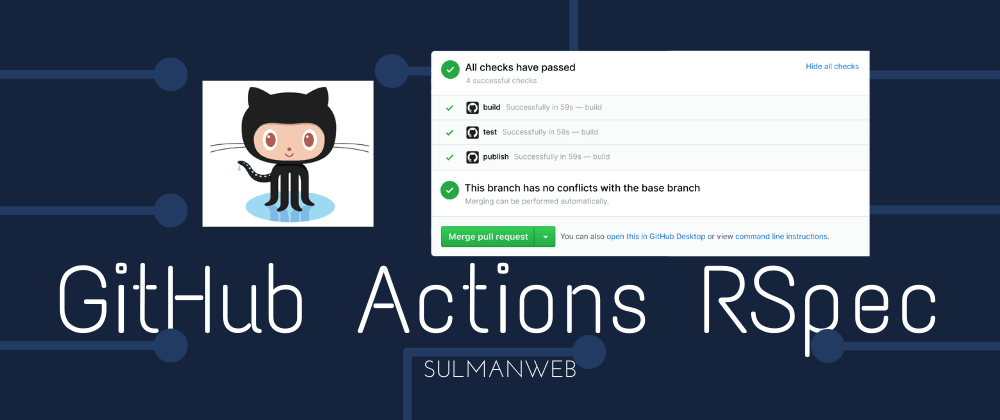GitHub Actions: Run RSpec Test On Every Push Free
GitHub Actions make it easy to automate all your software workflows, now with world-class CI/CD. Build, test, and deploy your code right from GitHub. Make code reviews, branch management, and issue triaging work the way you want.

GitHub has a great feature called GitHub Actions. Recently, GitHub has made this feature free for around 2000 minutes with 2 Core and 7 GB systems per month.
GitHub Actions make it easy to automate all your software workflows, now with world-class CI/CD. Build, test, and deploy your code right from GitHub. Make code reviews, branch management, and issue triaging work the way you want.
I use GitHub Actions for two major purposes:
- Auto-start unit-testing on every push to validate the code pushed to the repo.
- Second to automatically deploy the code to the server when code is pushed to the master branch. So, no need to deploy after doing hectic coding.
In this article, I will explain "How I use GitHub Actions To Run RSpec Unit Testing Suite Once my code is pushed to any branch in GitHub.".
Init GitHub Actions In Repo:
Create a folder in the root of the repo named .github and then create a folder named workflows inside .github folder.
Now create a YAML file inside the workflows folder with the name of the task. I create the file name api-rspec.yml in the folder to test RSpec for the API.
Settings through the YAML file:
The final file can be seen in the code below:
name: CI RSpec Tests
on: [push, pull_request]
push:
paths:
- 'api/**'
pull_request:
paths:
- 'api/**'
jobs:
build:
name: CI
runs-on: ubuntu-latest
env:
api-dir: ./api
services:
postgres:
image: postgres:11.6
ports: ["5432:5432"]
options: --health-cmd pg_isready --health-interval 10s --health-timeout 5s --health-retries 5
redis:
image: redis
ports: ["6379:6379"]
elasticsearch:
image: elasticsearch:6.8.8
ports: ["9200:9200"]
options: -e="discovery.type=single-node" --health-cmd="curl http://localhost:9200/_cluster/health" --health-interval=10s --health-timeout=5s --health-retries=10
steps:
- uses: actions/checkout@v1
- uses: actions/setup-ruby@v1
with:
ruby-version: 2.6.6
- name: Install PostgreSQL
run: sudo apt-get -yqq install libpq-dev
- name: Run bundle install
working-directory: ${{env.api-dir}}
run: |
gem install bundler
bundle install --jobs 4 --retry 3
- name: Setup Database
working-directory: ${{env.api-dir}}
env:
RAILS_ENV: test
PGHOST: localhost
PGUSER: postgres
run: bin/rails db:create db:schema:load
- name: Build and test with rspec
working-directory: ${{env.api-dir}}
env:
RAILS_ENV: test
PGHOST: localhost
PGUSER: postgres
run: bundle exec rspec spec
Explaining the Above Code:
Line 1, I gave the name to my GitHub Action to be performed.
Line 3…9, As my repo is monorepo with API and front in the same repo I said that on every push and pull request in the repo if something changed in a folder called api then call this GitHub Action.
Line 11…16, Defines the job of building a system to GitHub Actions. And tells GitHub to run the action on the latest ubuntu machine with a directory of rails is /api.
Line 18…29, My Rails includes services like Redis, Postgres and elastic search. So, I tell here to initialise those services in the ubuntu machine we created above. Furthermore, verify that services have started especially elastic search as it takes around 10-15 seconds to start the service.
Line 31…35, I used prebuilt GitHub official actions to get the code and install ruby according to the provided version to the ubuntu machine.
Line 37,38, I installed the Postgres packages needed by my code to run successfully.
Line 40…44, Now I run a bundle install in my code so that the gems required by my rails project are included in the system.
Line 45…51, Now I attach the ubuntu machine Postgres with my code and do the migrations to set the database according to schema loaded.
Line 53…59, Now nothing is left just run the RSpec, and It will test all the unit tests included in my code.
Conclusion:
GitHub is providing a free machine that boots up when I push code or create a pull request. Then this machine tests the newly pushed code according to provided test cases and validates that the pushed code doesn't break the previous features.
Now, when I push a code site back and relax, and when GitHub's ✅ comes to the pushed code this shows the new code is ready to be deployed without any worries.
Happy Coding!